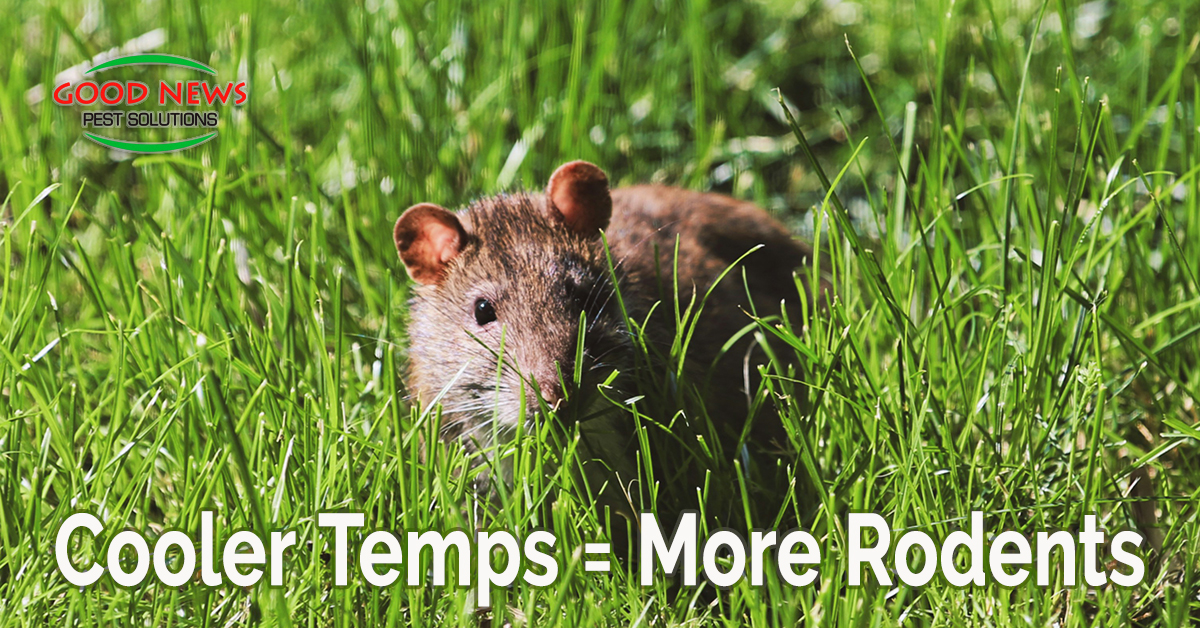
Cooler Temps = More Rodents
Between the mercury in our thermometers finally staying (mostly) under 80-degrees and multiple major property development deals on the horizon for the Gulf Coast of Florida, we’re bound to see an increase in activity from local rodents.
While the developments might not push the native mice and rats out into the spotlight for a couple of years, the weather will make the ones already active head toward safe, warmer shelter – like inside your home or business.
In addition to the obvious issues with mice and rats – nobody wants them scurrying underfoot or worse, being bitten - these creatures also bring other problems into your home.
Rodent droppings, urine, and saliva can be filled with nasty bacteria that can easily spread to humans, causing Hantavirus, Salmonellosis, Lymphocytic choriomeningitis, and, although it’s much rarer now, bubonic plague.
Often, wild mice and rats are also infested with ticks, mites, and fleas that can bite you or your pets, as well as spread other annoying or dangerous diseases.
Field Mice
For many years, these Gulf Coast native rodents seemed to pop up everywhere as new construction forced them out of their natural habitat. Today we see fewer of them, but you should still know how to spot field mice.
Mice are generally lighter in color, smaller, and more agile than rats. They usually grow to about 3-4 inches in length with larger, floppier ears compared to the rest of their bodies. Mice live for about a year and are more curious than other rodents. They are omnivorous, but prefer grains, seeds, and plants.
Mice reproduce more often and produce larger litters than rats, which is why they can spin out of control quickly if not discovered. They have smaller, hairier tails that usually measure about the same length as the rest of their bodies.
Norway Rats
There are two species of rats found throughout the Sunshine State. Because we’re close to the coast, we tend to get both varieties in about even numbers. But the deeper you are inland, the less chance you’ll have to deal with Norway Rats.
Despite their name, these rodents are not Scandinavian. In fact, they likely originate from Asia, but are now common across Europe and the Americas. They are most prevalent around sea coasts and canals and are spotted most often digging through garbage bags and dumpsters.
These reddish-brown, heavy-set rats prefer to eat fish and meat, but will settle for what they can find - and you will find them burrowed deep around concrete and under foundations. They have long, scaly tails, and leave ¾ to 1 inch capsule shaped droppings.
Roof Rats
If you discover a rat infestation in your home, especially in the attic areas, it’s most likely the other popular rat in Florida – the Roof Rat.
The Rattus rattus gets its common name from the fact that they tend to be climbers, preferring to nest off the ground. That may be in tall citrus trees, palm trees, ornamental shrubbery, and, of course, in your attic.
In an orchard, roof rats can quickly destroy the citrus crop, gnawing through their weight on whatever citrus fruits they can find. You’d think they’d be smarter, but the drive to chew is so deeply embedded in their genetics, they’ll chew through electrical wires, wood, and even gnaw aggressively on metal.
They tend to be lighter color and slightly smaller than Norway rats, gray to tan.
Infestation Issues
Look for rodent droppings, nesting materials (shredded paper, fabric, insulation etc.) around food packages, in drawers or cupboards, and under the sink. You may also notice signs of chewing – holes in food packages or in the walls or baseboards.
The biggest issues that arise from a rodent infestation is that by the time you notice them the situation is most likely already severe. If that’s the case, you’ll need professional help.
The Good News Pest Solutions Premier Rodent program is the most comprehensive service available. We start by excluding all known entry points and covering roof vents with proprietary covers. This keeps new rodents from making entry.
Afterwards, we trap out any rodents inside and install bait stations around the exterior perimeter to monitor your property and make sure no live rodents are still inside. When we are certain there are no more inside, we vacuum reachable droppings and treat your attic with the most effective, green deodorizer, sanitizer, and viruscide. Many of our clients also install our top-of-the-line T-A-P insulation – making your attic look and smell brand new. TAP also works wonders for sound proofing, insect prevention and weather insulation, often reducing your power bill – and it’s free of allergens and strange chemicals.
For more details on T-A-P or our Premiere Rodent program, please give us a call!
« Back to BlogProudly Serving
Sun City Center, Ruskin, Palmetto, Parrish, Ellenton, Bradenton, Anna Maria, Holmes Beach, Bradenton Beach, Longboat Key, Lakewood Ranch, University Park, Myakka City, Sarasota, Siesta Key, Osprey, Nokomis, Casey Key, Venice, Englewood, North Port, Port Charlotte, Punta Gorda, Arcadia
Things You Can Do
Pay Your Bill Online
Leave Us a Review
Request a Free* Termite Inspection
Stop Mosquito Bites
Get Rid of Rodents
Get a Termite Damage Warranty
Get Pest Control for Your Attic
Get Pest Control for Your Business Request Prayer
Corporate Address
1080 Enterprise Court, Ste A
North Venice, FL 34275
Call Now: (941) 412-9610
Text: (941) 412-9610
Fax: (941) 412-0080
